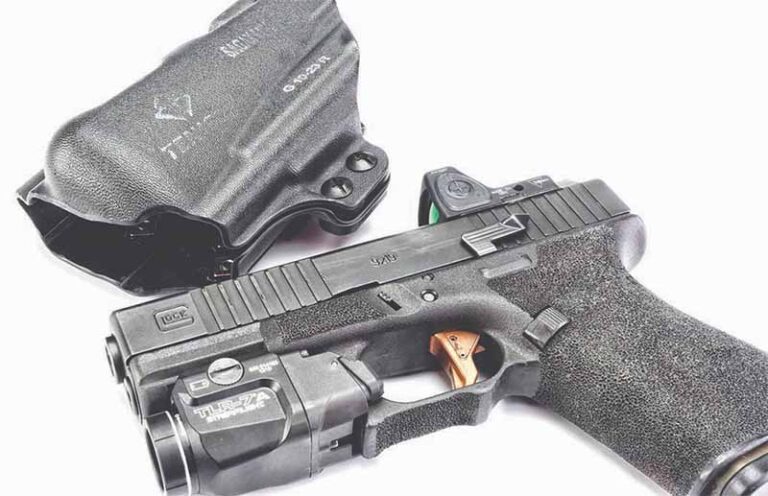
If you modify your carry gun, will it work against you in court if you’re forced to use it defensively?
There may be a time where a prosecutor will try to make an issue out of the newfangled optical sight on a pistol someone used in self-defense. In fact, it’s likely already happened, and there’s a long history of attacking the gun in court, as opposed to the individual. The logic is that “if the gun is evil, the owner must be, too.”
I’ve been involved in the firearms training industry long enough to have seen progression, starting with officers putting custom grips on their Smith & Wesson Model 19 revolvers and then laser grips on those same revolvers, to using semi-auto pistols and night sights. The progression continued to adding laser grips to semi-auto pistols and, lately, adding red-dot sights.
But that’s not all of the modifications people do to their sidearms. Many people, unhappy with how hard the trigger pull is, take the pistol to the local gunsmith for a “trigger job.” Or, they do one themselves after reading a gunsmithing book or watching a YouTube video. In fact, I’ve personally done all of the above to different handguns I’ve used over the years.
Walking The Line
The question I often get from members of the Armed Citizens’ Legal Defense Network is this: Will doing one or more of these modifications work against me in court? And the answer I typically give is, “It depends.”
Was the modification a primary reason for the gun to malfunction (like in an accidental discharge because the trigger job was faulty)? Did that result in injury or death to someone? Are you being charged with a crime because of that injury or death? If so, then, yes, it’ll likely be used against you.
But what if the modification you made to your pistol was intended to simply make it shoot more accurately for you, such as night or laser sights in low light, or the aforementioned red-dot sight? Then, that’s probably not a big deal … unless the prosecutor wanted to portray you as a crazed killer who spent money to modify his pistol so it’d be a more proficient killing machine. That accusation can be easily defeated if your attorney understands the issues of modifying handguns and is ready to lead you through a rational argument for the jury.
So, what would that argument likely be?
For starters, a discussion of the training you received prior to the incident would take place, where you learned that you were responsible for all bullets that left the barrel of the gun. You’d also likely discuss your knowledge of armed citizen encounters, where innocent persons were struck by bullets that missed their intended targets. Thus, you’d be able to testify that you were very much aware that, in the event, you felt it necessary to use the firearm for its intended purpose (defense of self or others in the face of illegal use of deadly force against you or others) that you wanted to make sure all bullets you fired hit your intended target.
After the above testimony, you or your expert would discuss why the modifications you had done to your gun were meant to increase the likelihood that you wouldn’t miss. You’d discuss what a “manageable trigger” is and why you paid money out of your own pocket to make sure the trigger was satisfactory.
You or your expert would discuss the different modifications done, such as why a better set of grips would improve the manageability of the recoil and allow for indexing the sights on target easier. Also discussed would be why night sights would allow you to hit your intended target easier in darkness (and at the same time avoiding missing and hitting bystanders). The same argument would be said for laser-aiming devices and the popular red-dot sights.
When you or your expert’s testimony was made, you should’ve done a very good job explaining (and hopefully convincing the jury) that these modifications were the result of you going overboard to make sure you were a responsible gun owner. Hopefully, you’d never have to testify about this, and hopefully, your defense attorneys would understand that these issues may come up in court regarding your case and take steps to mitigate the issues before testimony.
For example, I worked as an expert on a case where the defendant used a 15-shot 9mm Glock 19 to defend himself and his family. During the trial, the prosecutor asked the defendant how many rounds the gun held (he knew the answer but wanted to get the information in front of the jury). During closing remarks, he made a big deal out of how the defendant used a high-capacity pistol during the shooting.
That case resulted in a hung jury. In the retrial, I once again worked for the defense. But now knowing what the prosecutor would likely try again, I had the defense attorney ask every police officer who testified what kind of gun they carried, and how many bullets it held? (They used Glock 17s, which took 17-round magazines.) By the time the defendant testified again, the prosecutor never asked the question.
Be Safe, Be Smart
Now, having said the above, some modifications might work against a defendant, like deactivated safeties or engraving cute sayings or Punisher skulls on the slide or frame of the gun. Avoid those at all costs. The bottom line is it’s perfectly justifiable to do some modifications to your carry pistol. The key is to know which ones and how to explain them if necessary.
Editor's Note: This article originally appeared in the 2023 Buyer's Guide special issue of Gun Digest the Magazine.
More Knowledge For The Armed Citizen:
- Carry Law: What Is A Righteous Shooting?
- Concealed Carry and the Right to Remain Silent
- Tips For Communicating With Police After Shootings
- Concealed Carry: After the Shooting
- Q&A: Massad Ayoob On Self-Defense In 2020 America

Next Step: Get your FREE Printable Target Pack
Enhance your shooting precision with our 62 MOA Targets, perfect for rifles and handguns. Crafted in collaboration with Storm Tactical for accuracy and versatility.
Subscribe to the Gun Digest email newsletter and get your downloadable target pack sent straight to your inbox. Stay updated with the latest firearms info in the industry.

![Best Concealed Carry Guns In 2025 [Field Tested] Wilson Combat EDC X9S 1](https://gundigest.com/wp-content/uploads/Wilson-Combat-EDC-X9S-1-324x160.jpg)


![Best 9mm Carbine: Affordable PCCs [Tested] Ruger Carbine Shooting](https://gundigest.com/wp-content/uploads/Ruger-Carbine-Shooting-100x70.jpg)
![Best AR-15: Top Options Available Today [Field Tested] Harrington and Richardson PSA XM177E2 feature](https://gundigest.com/wp-content/uploads/Harrington-and-Richardson-PSA-XM177E2-feature-100x70.jpg)
